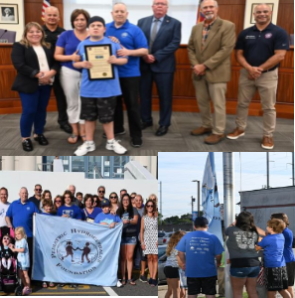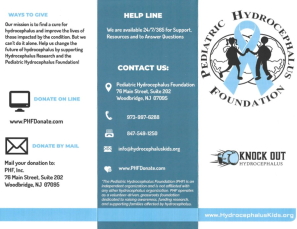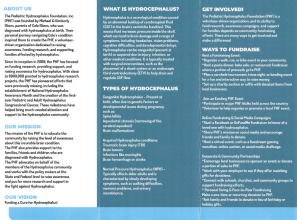Toddler Matthew Campuzano From Pennsylvania Joins His Big Sister as 2017 National Ambassador for Incurable Brain Condition
January 6, 2017 by PHF
Filed under Uncategorized
Comments Off on Toddler Matthew Campuzano From Pennsylvania Joins His Big Sister as 2017 National Ambassador for Incurable Brain Condition
Toddler Matthew Campuzano From Pennsylvania Joins His Big Sister as 2017 National Ambassador for Incurable Brain Condition
Matthew was born in April 2015, our fifth baby. He was diagnosed with Hydrocephalus at 20 weeks, and he developed in uterine very similarly to Julia.
 Once again, the Doctor’s prepared us for the worst, but we knew that Matthew would be a fighter like his big sister. He was born at 35 weeks, and he spent a few weeks in the NICU to receive his first shunt and get over the hurdles of prematurity.
Once again, the Doctor’s prepared us for the worst, but we knew that Matthew would be a fighter like his big sister. He was born at 35 weeks, and he spent a few weeks in the NICU to receive his first shunt and get over the hurdles of prematurity.
Matthew still has the shunt that was placed when he was 3 days old. It’s been working wonderfully for him. He has been receiving physical therapy since he was 6 weeks old, but he will be discharged very soon!
At 18 months, he is walking and talking up a storm. He is the family comedian, and he makes us laugh all the time! Matthew became a big brother this past summer, and he loves our new baby so much!
At this point, while we know it’s there, they have not found the genetic cause for Julia and Matthew’s Hydrocephalus. We need more research so we can make advancements!
6-Year-Old Julia Campuzano From Pennsylvania Joins Her Brother as 2017 National Ambassador for Incurable Brain Condition
January 6, 2017 by PHF
Filed under Uncategorized
Comments Off on 6-Year-Old Julia Campuzano From Pennsylvania Joins Her Brother as 2017 National Ambassador for Incurable Brain Condition
6-Year-Old Julia Campuzano From Pennsylvania Joins Her Brother as 2017 National Ambassador for Incurable Brain Condition
Julia was born in October of 2010. She was our third child and the first girl! Our second son had passed away as an infant from a heart defect. At 20 weeks into my pregnancy, Julia was diagnosed with ventriculomegaly. As the pregnancy continued, the Doctor’s confirmed that she had severe Hydrocephalus.
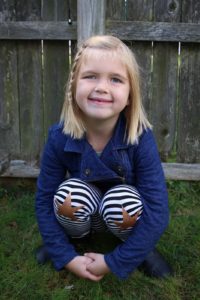 We were told she may never walk, talk, see or function like an average child. We waited patiently for her arrival. She was born at 33 weeks, and she came out screaming. At 6 days old she received her first shunt. At 6 weeks old, she developed an infection and had her second and third surgery to remove and place a new shunt. She also developed epilepsy at this age.
We were told she may never walk, talk, see or function like an average child. We waited patiently for her arrival. She was born at 33 weeks, and she came out screaming. At 6 days old she received her first shunt. At 6 weeks old, she developed an infection and had her second and third surgery to remove and place a new shunt. She also developed epilepsy at this age.
Julia has now had 5 brain surgeries, and she has come through them all with flying colors. She was behind in gross motor skills for the first two years of her life, but now she is doing wonderfully. Her epilepsy has given us a lot of trouble as we’ve navigated the vast array of medications and side effects, but she is well-controlled for now.
She is now 6 years old and loving kindergarten. She is beginning to read and share her joy with the world. She is a special child who can cheer you up on your worst days.
We can’t wait to see what the future holds for her!
PHF In the News: PHF Pennsylvania Presented With Donation Check
June 12, 2013 by PHF
Filed under Uncategorized
Comments Off on PHF In the News: PHF Pennsylvania Presented With Donation Check
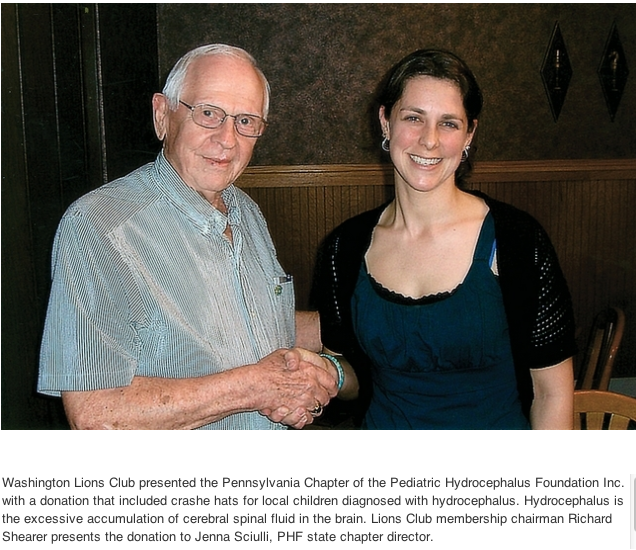
Source: Observer-Reporter
DANTE’S DRIVE Chartiers Twp. toddler inspires others with hydrocephalus
April 12, 2012 by PHF
Filed under Uncategorized
Comments Off on DANTE’S DRIVE Chartiers Twp. toddler inspires others with hydrocephalus
PHF in the news again!!!! Our own PA PHF Chapter Jenna Sciulli and her son Dante!!! 🙂
As Dante Sciulli ran through the family’s backyard toward the swing set, his mother, Jenna, encouraged her son’s independence and marveled at the 4-year-old’s exuberance.
A few months ago, she probably would have been a bit more protective – and nervous.
But after undergoing his third brain surgery in October to relieve symptoms from hydrocephalus, the Chartiers Township youngster is doing very well, and his strength, stamina and muscle tone continuing to improve, thanks to twice-weekly physical therapy sessions at the Children’s Therapy Center in Peters Township and Washington.
He not only is an inspiration to his mom and dad, David, and his siblings, Luca, 10, and Elena, 8, but also the millions who are living with the condition.
It’s also why Jenna now serves as the volunteer director of the Pennsylvania Chapter of Pediatric Hydrocephalus Foundation Inc., one of 21 state chapters throughout the United States.
When Dante was diagnosed with hydrocephalus, there were no local support groups where Jenna and her husband could obtain educational and emotional support. For a while, they participated in a support group in Cleveland.
“Dante is doing so well and I have the time,” Jenna said. “After talking with other parents, I took the role because I felt like I could. I wanted to be there for other parents.”
And the foundation is starting to pick up momentum, she said.
Jenna became the volunteer director last summer. Since then, the state PHF chapter has held several fundraisers and awareness events, and has donated money to Children’s Hospital of UPMC Department of Neurosurgery, National Research Foundation and family outreach. It also has partnered with Project Linus to provide blankets in goodie bags for patients at Children’s Hospital in Pittsburgh and Ruby Memorial Hospital in Morgantown, W.Va.
Hydrocephalus is a buildup of cerebrospinal fluid inside the skull that leads to brain swelling. The fluid surrounds the brain and spinal cord, and helps cushion the brain. CSF normally moves through the brain and the spinal cord, and is soaked into the bloodstream. CSF levels in the brain can rise if:
n Its flow is blocked;
n It does not get absorbed into the blood properly;
n The brain produces too much of it.
Too much CSF puts pressure on the brain, pushing it against the skull and damaging brain tissue. One in 500 newborns is diagnosed with hydrocephalus each year in the United States, and, according to Jenna, it’s the No. 1 reason for pediatric brain surgery in the country.
There are two forms of hydrocephalus: congenital and acquired.
Congenital hydrocephalus begins in the womb. It is common in babies who have a birth defect in which the spinal column does not close properly.
“A lot of times, it’s secondary to something else,” said Jenna, noting that those with congenital hydrocephalus often incur more setbacks and have more physical and mental disabilities.
Dante has acquired hydrocephalus.
When Dante was born in June 2007, he spiked a fever and spent several days in the neonatal intensive care unit. Even though nobody suspected hydrocephalus, when Dante was discharged from the hospital, the Sciullis were told to keep an eye on him.
It wasn’t until Dante’s head began to bulge in a matter of days that the couple realized something was wrong. He was 3 months old.
Dante had a CAT scan and MRI, which revealed a brain cyst. Jenna said the cyst probably developed before he was born.
Since learning about the condition, Jenna said in hindsight, Dante probably was experiencing symptoms for at least a month. For instance, Dante did nothing but fuss when the family was driving through the mountains during their vacation to the beach as the pressure on his brain increased with the change in altitude.
“But a medical problem wasn’t expected,” she said.
In infants with hydrocephalus, early symptoms also may include eyes that appear to gaze downward, irritability, seizures, sleepiness and vomiting.
Following his diagnosis, Dante had surgery to excise the cyst. A few weeks after that, a shunt was implanted to relieve the pressure in his brain.
At the time, the family lived in Wexford, where Dante’s pediatrician immediately prescribed physical therapy. “Dante had to learn to hold up his head again,” Jenna said.
He has taken physical therapy twice a week ever since to improve his muscle tone and increase his strength.
In October, Dante underwent his third surgery, this time to replace the shunt. The surgery involved three small incisions so doctors could thread the tubing from the shunt at the top of his head to behind his ear, through the chest cavity and into his stomach.
Jenna said the tubing uncoils, and it is long enough that Dante could grow to 6 feet tall and it won’t present a problem.
Dante’s shunt also is magnetically programmable, so if adjustments need to be made, they can be done electronically at the hospital. As a result, he must avoid contact with extremely strong magnetic fields, and he is unable to participate in contact sports.
In August, the Sciulli family will attend National Hydrocephalus Awareness Day on Capitol Hill, where they will meet with U.S. congressmen. Dante also may get to meet a few friends with hydrocephalus who he has met online.
“It will be good, too, for the other kids to see siblings of children with hydrocephalus,” Jenna said.
For more information, become friends with Pennsylvania Pediatric Hydrocephalus Foundation Inc., on Facebook, or visit www.hydrocephaluskids.org.
Infobox:
Pediatric Hydrocephalus Foundation Inc., Pennsylvania Chapter, is holding a fundraiser through April at Beechie’s Place, 400 W. Pike St., Meadow Lands. Hydrocephalus ribbons can be purchased, and a percentage of all kids’ meals will benefit the state PHF chapter.
 Read more at: https://html.com/attributes/img-width/>
Read more at: https://html.com/attributes/img-width/>










